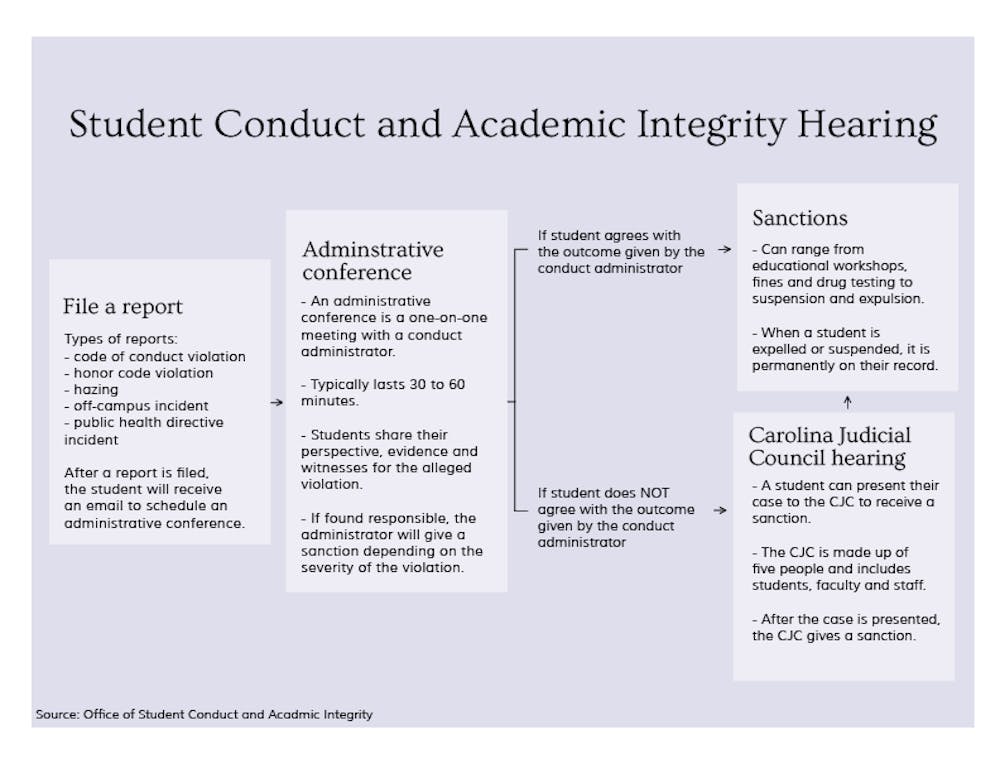When a student or organization allegedly violates university policy, the Office of Student Conduct and Academic Integrity has a hearing process to determine if a violation happened and, if it did, the resulting sanction. The focus of the process is "one of education," according to Marc Shook, dean of students and deputy Title IX director.
"The criminal justice system is about reducing recidivism and punishment. The Office of Student Conduct is not that," Shook said. "We want students who make a mistake to learn from their mistake, to grow from it; not do it again. But we are the unit that has the responsibility of enforcing rules properly [put into effect] by the university."
As of Sept. 4, 22 students are on interim suspension for violating public safety, and six Greek organizations are charged with student conduct violations.
Interim actions, such as suspensions, are taken when a student or student organization "poses a threat to health, safety, or property," according to the Student Conduct and Academic Integrity website. Students who are on interim suspensions cannot return to campus, attend class or go to any university events until the conduct hearing is completed. Organizations cannot hold any activities and are required to leave their university space if they are the subject of an interim action.
There are five types of reports that can be filed with the university: code of conduct violation, honor code violation, hazing, off-campus incidents and a public health directive concern report.
The public health report was created this year in response to the coronavirus pandemic. This form allows students to report concerns in the following areas: face coverings, social distancing, contact tracing, large gatherings and quarantine/isolation.
The university's jurisdiction is university property, off-campus university-sponsored activities and when a student is found to "threaten the health/safety of campus" and "disrupt the university learning environment no matter where such behavior may occur," according to the Code of Conduct.
Before classes began, the Leadership and Service Center sent a "What Constitutes an Event?" document to leaders of student organizations. It contains 32 questions to help student leaders determine if an event is a university event. If it is, the university’s Code of Conduct applies.
“I think this provides students with a whole lot of questions to consider, but it also puts the focus on students to consider what responsibility do they have," Anna Edwards, associate vice president for student life, said. "The whole premise of this is to do our part to create a healthy and safe community."
Once an alleged violation is reported, the individual student or the representative from the organization will have a conference with a conduct administrator. At this meeting, students will have the opportunity to share their perspective and provide documentation before the administrator decides the outcome of the case.
For cases that are less severe, the outcomes will be educational, according to Maureen Grewe, director of student conduct. But if the violation is more severe, it could lead to a potential suspension or expulsion.

“There's not a one-size-fits-all outcome," Grewe said. "As you could imagine, these cases will be different depending on the circumstances, but I think, you know, we'll be able to see what that is depending on that intense severity and if it's a repeated behavior or not."
If a student does not agree with the sanctions given by the administrator, their case can be heard by the Carolina Judicial Council (CJC), which is made up of students, faculty and staff. At the CJC hearing, students present their cases to a panel of five people.
"The vast majority of times, [Carolina Judicial Council is] consistent in their thinking with the conduct administrator," Shook said. "But there are times where, for example, a student could come into the CJC hearing and make a complete jerk of themselves and rub the CJC the wrong way and get a harsher sanction."
Grewe said depending on how competitive the pool of applicants is, the CJC can have between 10 to 100 people in the organization. The CJC does not have a limit to the number of members. CJC members receive over 45 hours of training in preparation for hearings.
Students have the option to have an adviser at the administrative conference and the Carolina Judicial Council hearing. Advisers can be there for support, but they cannot speak on behalf of the student.
Grewe said the majority of students do not bring an adviser to the conference or hearing. Occasionally, there will be attorneys present, but the "overwhelming majority" of students don't have an attorney.
Sanctions can range from fines and educational sanctions to suspension and expulsion.
For student organizations, if a sanction has been given, the university is required to publicly disclose the findings of the violation and what sanctions were given under the Tucker Hipps Transparency Act.
The Office of Student Conduct does programming with groups such as resident mentors, orientation leaders, University 101 classes and student organizations. It also uses social media campaigns, town halls and the I Pledge Columbia campaign to educate students about community expectations and the Carolinian Creed.
"Our student conduct administrators view themselves as educators that are taking part in the larger mission of the university, which is to educate students that can graduate with maturity and responsibility and have the tools necessary to contribute to society," Shook said.

